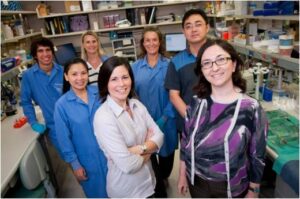
Mayo Clinic researchers are developing a simple blood test to make it possible for more African American people to get an accurate diagnosis of Alzheimer’s disease. This was possible because of Jacksonville community members’ participation in a research consortium.

Alzheimer’s disease can be difficult to diagnose because other types of dementia have similar symptoms. Doctors currently can look for two types of biological markers (biomarkers) of Alzheimer’s disease to help make an accurate diagnosis.
Both biomarkers have very good accuracy, up to 98%, but they require either specialized brain imaging or a spinal fluid sample. Both of those procedures are costly and not all doctors have the instruments or expertise to perform them.
If a simple blood test to check for Alzheimer’s disease biomarkers existed, more people could receive an accurate diagnosis.
Minerva Carrasquillo, PhD, a neurogeneticist, and Nilufer Ertekin-Taner, M.D., Ph.D., a neurologist and neurogeneticist, work in the Mayo Clinic Alzheimer’s Disease Research Center (ADRC). Their research will help develop that blood test.
They study the complex genetics of Alzheimer’s disease and related dementias. Knowing that African Americans are at greater risk for developing Alzheimer’s disease, Dr. Ertekin-Taner and her team established the Florida Consortium for African American Alzheimer’s Disease Studies. The consortium gathers blood samples and brain-health information from African American participants in studies on aging and dementia at the Mayo Clinic Alzheimer’s Disease Research Center in Jacksonville, and at the Wien Center for Alzheimer’s disease and Memory Disorders at Mount Sinai Medical Center in Miami.
Dr. Carrasquillo led a research team that used the consortium’s blood samples to identify biomarkers in plasma that can help diagnose Alzheimer’s disease.
To find the biomarkers, the team measured levels of potentially important molecules in plasma from 420 African American participants with and without Alzheimer’s disease.
“We found 6 specific molecules in blood plasma that improved diagnosis of Alzheimer’s disease in African Americans,” says Dr. Carrasquillo, who is senior author of the research study.
Diagnostic accuracy using typical Alzheimer’s disease risk factors, such as age, sex, and presence of a gene associated with risk, is 69% among African Americans. But when the investigators added the 6 plasma biomarkers to the prediction model, diagnostic accuracy jumped to 77%.
Future studies will test additional blood plasma molecules to continue increasing diagnostic accuracy closer to 100%.
Drs. Carrasquillo and Ertekin-Taner hope these studies will also shed light on biological mechanisms that may contribute to why African Americans are at greater risk for Alzheimer’s disease. For example, one of the blood markers is related to inflammation, which may be an important risk factor.
Mayo Clinic investigators are grateful to Jacksonville community members for participating in Alzheimer’s Disease Research Center studies. Their participation is crucial to the fight against Alzheimer’s disease, not only through discovery of blood plasma biomarkers, but also through studies of genetic and sociocultural contributions to disease, as well as clinical trials of new medications.
“Determining the most relevant risk factors and mechanisms of disease in each community will help us develop ways to prevent and treat Alzheimer’s disease equitably in all communities,” Dr. Carrasquillo says.
For information on the Alzheimer’s Disease Research Center (ADRC) at Mayo Clinic please visit https://dementiaoutreach.mayo.edu/
Envision yourself working for a global leader in an industry fueled by innovation and growth. Mayo Clinic has opportunities for you. Join us at Florida’s No. 1 hospital by visiting https://jobs.mayoclinic.org/. For more information on health care topics please visit Mayo Clinic Jacksonville at mayoclinic.org.

Be the first to comment